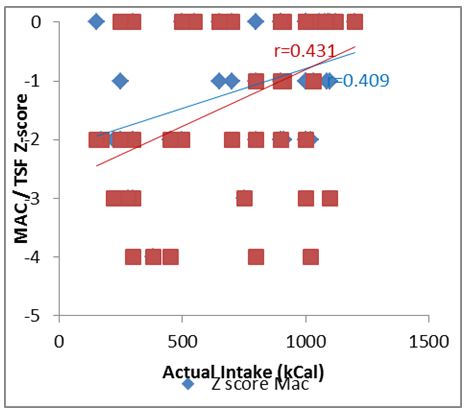Day 1 :
Keynote Forum
Mario Guslandi
S Raffaele University Hospital, Italy
Keynote: Probiotics in diverticular disease
Time : 09:05-09:45

Biography:
Mario Guslandi is the Head Clinical Hepato-Gastroenterology Unit Division of Gastroenterology- S.Raffaele University Hospital, Milan, Italy. He is Graduated in Medicine and specialized in Gastroenterology from the University of Milan. He has been Research fellow and then Consultant Gastroenterologist at the Institute of Internal Medicine of University of Milan from 1978 to 1990. In 1990 he moved to S.Raffaele Hospital of Milan, where he is Head of the Clinical Hepato-Gastroenterology Unit and of the IBD Centre. He is also Adjunt Professor at both the School of Medicine and the Post-graduate School in Gastroenterology of the S.Raffaele University of Milan. Dr Guslandi is a Fellow of the American College of Gastroenterology and a member of the British Society of Gastroenterology. He is author of 500 scientific papers, most of which appeared in international medical journals and participated as a speaker in various international congresses and symposia.
Abstract:
Background: Diverticular disease of the colon is a common condition, the prevalence of which increases with age. In most subjects diverticula remain asymptomatic, whereas in about 20% of cases patients develop symptoms such as recurrent abdominal pain, changing in bowel habits and bloating, which are very similar to the clinical presentation of irritable bowel syndrome. On the other hand diverticulosis may lead to acute inflammation (diverticulitis) with pain exacerbation, sometimes fever and the risk of further complications such as abscess formation, bleeding and perforation. The main cause of diverticular inflammation is thought to be local bacterial overgrowth, promoted by slow colonic transit (constipation) and fecal stasis in the diverticula. HIgh-fiber diet, courses of mesalazine and especially cyclic administration of poorly absorbed antibiotics such as rifaximin, are commonly employed to prevent development of inflammation in the diverticula. Broad spectrum antibiotics either by oral or intravenous route are employed to treat episodes of acute diverticulitis.
Rationale: Manipulation of the gut microbiota may provide a safer and more attractive alternative to the use of antibiotics to prevent diverticulitis. The mechanisms of action of probiotics include inhibition of enteric pathogens, competition with pro-inflammatory microbes, stimulation of local immunological defenses, and down-regulation of inflammatory cytokines such as TNF alfa.
Results: Uncontrolled studies with non-pathogen Escherichia coli Nissle 1917, with Lactobacillus paracasei, a lactobacilli bifidobacteria mixture, and the probiotic cocktail VSL#3 have provided promising results in controlling symptoms and maintaining remission. Other studies have compared probiotics with either mesalazine or a combination of both, the latter appearing more effective in maintaining long-term remission. On the other hand, only two randomized, placebo-controlled double blind trials are available at the present time, one suggesting that Lactobacillus casei plus mesalazine may be more effective than either agent alone and the other one failing to demonstrate a significantly superior efficacy of either Bifidobacterium infantis or mesalazine or a combination of both.
Conclusions: Overall, the quality of the available studies on the use of probiotics is poor, due to the shortage of double-blind controlled studies, limited observational periods in most cases, small samples of included subjects and variable protocols, which make it impossible also to perform a meta-analysis. In view of the sound rationale and the promising, although still inconclusive results, further studies are warranted to better define the role of probiotics in this disorder.
Keynote Forum
David J Kyle
Evolve Biosystems, USA
Keynote: From dysbiosis to recovery in the infant gut microbiome: A new paradigm in infant nutrition
Time : 09:45-10:25

Biography:
David J Kyle is the CEO of Evolve Biosystems Inc., a spin-off of the Foods for Health Institute of the University of California at Davis. He founded several companies during his career, including Martek Biosciences Corp where he led R&D and Commercial Development for over 15 years. His DHA and ARA products are now found in virtually all infant formulas around the world. In 2011, he was acquired by DSM for $1.2B. He received his PhD in Biochemistry from University of Alberta, Canada. During his distinguished career, he published over 80 scientific articles and edited two books. He was inducted into the US Space Technology Hall of Fame in 2009 for his contributions to science and industry.
Abstract:
Statement of the Problem: Human milk has been the sole source of nutrition for infants for millions of years, and is rich in specific oligosaccharides (HMOs). The natural infant gut microbiome is dominated by a single species of bifidobacteria that is exceptionally competitive at consuming HMOs. Through the unintended consequences of formula feeding, antibiotic use, and C-section deliveries, this natural microbiome has been radically altered such that over 90% of newborn babies in the US today are dysbiosis. The purpose of this work is to develop a solution to rescue the natural microbiome from the dysbiosis through an early remodeling that returns the colonic microenvironment to its natural state.
Methodology: A randomized parallel controlled prospective clinical study (n=68) was undertaken in five sights in Davis CA, USA with healthy, term, breast-fed infants enrolled on day four of life. Half of the cohort was supplemented daily for 21 days with activated Bifidobacteria infantis, and half provided the routine standard of care.
Findings: All supplemented babies, regardless of mode of delivery, had a microbiome dominated to over 80% with B. infantis whereas the un-supplemented babies were devoid of B. infantis and 21 of 34 infants had no bifidobacteria at all. Differences in stool maturity, pH, microbial and chemical differences were also noted.
Conclusion & Significance: The natural hi-bif microbiome has been lost over the past 50-80 years in developed countries. The resulting dysbiosis may have a significant impact on the programmed development of the immune system and establishment of metabolic set points. We have shown that this dysbiosis can be corrected and the microenvironment reestablished by supplementation with activated B. infantis.
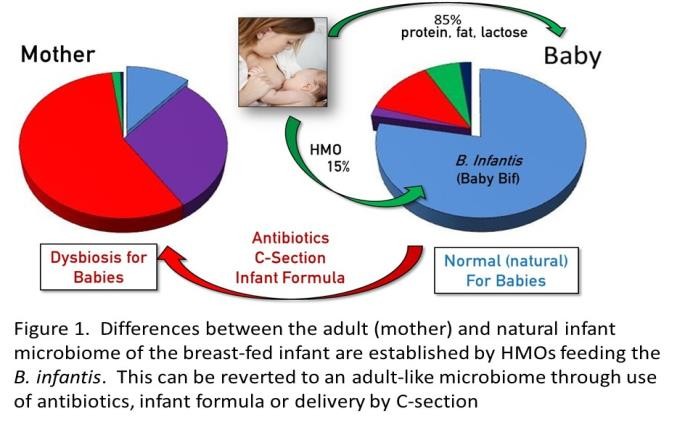
- Probiotics: Applications and Challenges | Regulation and Product Development | Mechanisms of action of probiotics | Probiotics in Gastroenterology | Probiotic Delivery Systems | Safety of Probiotic Organisms | Functional Foods
Location: Bader

Chair
David J Kyle
Evolve Biosystems, USA
Session Introduction
Daniel R Calvo
Biopolis, Spain
Title: New trends within the probiotics market: how producers should deal with them

Biography:
Daniel R Calvo is the Marketing & Communications Manager at Biopolis, a Spanish based biotech company producer of probiotics. He has expertise within the probiotics and food supplement industry by designing and developing new product ideas, communicating them (EFSA and FDA related issues) and giving marketing and promotion support to Biopolis’ clients and partners. He has previously worked in Coca-Cola and Millward Brown (both in Germany) and in Natraceutical in Spain. He holds an MSc in Food Economics & Marketing from University of Reading and BSc in International Marketing & Communications from Hochschule Bremen and University of Valencia.
Abstract:
It is undeniable fact that the probiotic market is suffering a transition where new trends are coming across. In addition to this, regulation (by means of EFSA in Europe) is extremely relevant. New trends and health claim regulations entail new challenges and impact on innovation. Furthermore, the industry is moving at a fast-growing pace so that products containing probiotics are attractive to both food and pharma companies. New indications from different nature-the so called third generation claims-appear more and more as hot topics/niches (atopic dermatitis, psoriasis, stroke, sport nutrition, gut-brain axis), abandoning soft communications such as digestive health or immune system support. In this sense, new and interesting final product ideas are being developed within the industry, where probiotic producers should acquire a relevant role, going together with pharma and food industry based companies as well as contract manufacturers in order to create outstanding synergies and fulfill new market needs.
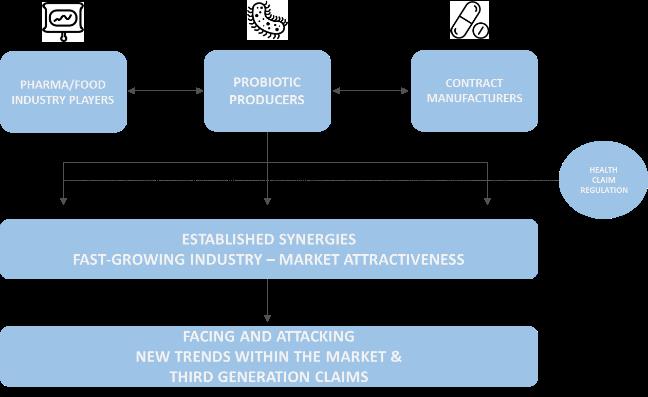
Abirami Pararajasingam
Lewisham and Greenwich NHS Trust, UK
Title: Lactobacillus: The not so friendly bacteria
Biography:
Abirami Pararajasingam is a Core Medical Trainee based in East Surrey Hospital. She recently completed her Foundation Year training in the South Thames Deanery, after spending the first year in Queen Elizabeth Hospital, Woolwich and second year in Medway Maritime Hospital. She completed her medical studies at the University of Liverpool between the years 2011-2015. Abirami has an interest in general internal medicine and has shown commitment in the areas of clinical education and maintaining and improving standards through audit practice.
Abstract:
We present a 65 year old diabetic patient with a complex liver abscess and bacteraemia from Lactobacillus paracasei. The abscess resulted in a prolonged hospital stay due to ongoing sepsis despite ultrasound-guided drainage and broad spectrum antibiotics. Furthermore, the patient developed several secondary complications including a right sided pleural effusion, an inferior vena cava thrombus and septic lung emboli. The abscess was eventually managed successfully with a prolonged course of antibiotics and multiple ultrasound-guided drainage procedures.
To our knowledge, this is the first reported case of probiotic consumption, confirmed by strain identification, as the source of a liver abscess. Probiotic products have been widely used for many years and are advocated to the general public for their health benefits with no warning of side effects. Lactobacilli are one group of bacteria commonly used in these products. Although rare, serious complications have been reported. Susceptible patients, such as those who are immunocompromised, should be advised against excessive consumption.
Heidi L Rowles
University of Cincinnati-Clermont College, USA
Title: Probiotics: Growth patterns of Lactobacilli and their effects on antibiotics, pathogenic bacteria, and other Lactobacilli strains

Biography:
Heidi L Rowles has studied aspects of probiotic bacteria and is now focusing on the growth rates and interactions of lactobacilli. She has investigated the effects of probiotics on ampicillin and penicillin, compared the growth rates of commercial probiotics to that of pathogenic bacteria, the effect of probiotic bacteria on pathogenic bacteria, and the effect of different media on these interactions. Her current research focuses on the growth rates of individual strains and combinations of lactobacilli.
Abstract:
Statement of the Problem: Incidences of bacterial infections continue to increase and alternative treatments need to be developed. People are seeking more natural and holistic medical care which includes probiotics. The microbiome has become a focus of interest in medicine and study of the gut bacteria is needed to determine the health impact of probiotics. Exploring the interaction of antibiotics and probiotics is an important area of research as antibiotics cause wide-spread devastation throughout the microbiome. Developing a probiotic that can combat the effect of an antibiotic on the microbiome is essential to eliminate the decimation caused by antibiotic therapy. Studying the growth of individual probiotic strains and combinations thereof is an important foundation in probiotic research and necessary in developing effective probiotic supplements.
Methodology & Theoretical Orientation: Standard bacterial growth curves were established for several commercial probiotics and compared to pathogenic bacteria. Probiotics and pathogenic bacteria were combined to establish growth curves for these amalgamations. Growth curves were established for individual strains of lactobacilli and some initial combinations of these strains. Ampicillin and penicillin susceptibility discs were used to treat plates of varying concentrations of probiotic bacteria to determine the effect by measuring the zones of inhibition.
Findings: Ampicillin and penicillin are less effective against a combination of Lactobacillus and Bifidobacterium than on the individual genera. A probiotic containing Lactobacillus fermentum exhibited a growth rate similar to the pathogenic bacteria.
Conclusion & Significance: The interactions of indigenous gut and probiotic bacteria are very complex and research into these interactions is needed to develop a deeper understanding of the role the microbiome plays in overall health. Research of probiotic bacteria is needed to develop effective probiotics. Emphasis should be placed on the study of Lactobacillus fermentum in the microbiome based on the results of this research.
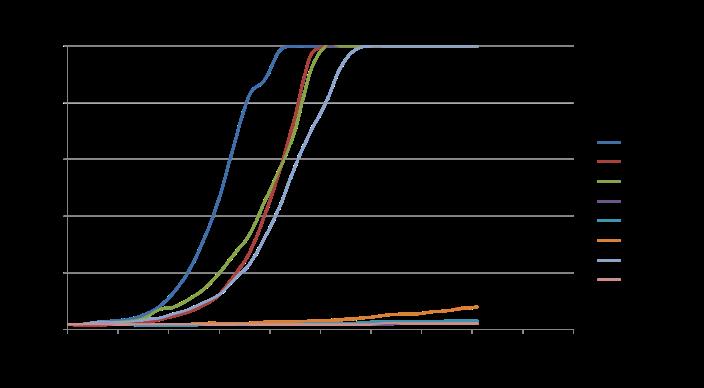
Muriel Thomas
INRA, Micalis Institute, France
Title: Microbiota of lung: Still an exploited source of probiotics?
Time : 12:00-12:25

Biography:
Muriel Thomas is a Senior Scientist at INRA and her projects focus on the health benefits sustained by diet and microbes. She leads the group microbiota and epithelia which has contributed to a better understanding of the dynamic dialogue installed between the intestinal epithelium and microbiota. Her expertise is based on the use of germ-free and gnotobiotic rodents combined with cellular tools and the isolation of new beneficial microbes. Recently, she has developed a new area of expertise around the microbes found in lungs and regulating the susceptibility to respiratory diseases like asthma. The group combines approaches at the frontier between physiology, microbiology, and nutrition. In addition, her engagement in public health agency (ANSES) and nutrition-specialized societies (SFNEP) is an asset to adapt her projects with the public health priorities, regulatory framework and food safety policy.
Abstract:
Statement of the Problem: The health is mainly influenced by the constant and dynamic cross talk required between microbiota and host. This paradigm is especially highlighted by the symbiosis existing between intestinal microbes and the gut. It is now proposed that keystone intestinal strains could be used as probiotics. As an example, Faecalibacterium prausnitzii, which is a major constituent of the intestinal human microbiota, is a promising candidate to develop prophylactic or therapeutic applications in human health. Thus, the characterization of several microbial communities from our body may help us to identify new bacterial species with beneficial effects on human health. We postulate that microbes with a high tropism for lungs may be new probiotics modulating the respiratory health. The purpose of this study was to isolate, screen and characterize new beneficial microbes isolated from lungs.
Methodology & Framework: Primo-colonizing strains were isolated from neonatal lungs of mice. These strains were screened for their immuno-regulatory properties after being co-incubated with axenic lung slices. The protective potential of selected strains towards HDM (House Dust Mite) allergic asthma was tested in mice.
Results: Viable bacteria (Staphylococcus, Streptococcus, Enterococcus, Listeria, Lactobacillus, Escherichia coli, Proteus mirabilis) were isolated from the lungs of mice three days after birth. One of strains (CNCM I 4969) stimulated the secretion of IL-12p70 and decreased the basal level of TSLP after 24 h of co-culture with slices of germ free lungs. CNCM I 4969 displayed also protective effects against HDM asthma in young mice.
Conclusion & Significance: We confirm that appropriate bacterial lung stimuli during early life are critical for susceptibility to HDM allergic asthma in young adults. We design a functional and efficient framework to screen lung microbes with beneficial effects in respiratory health.
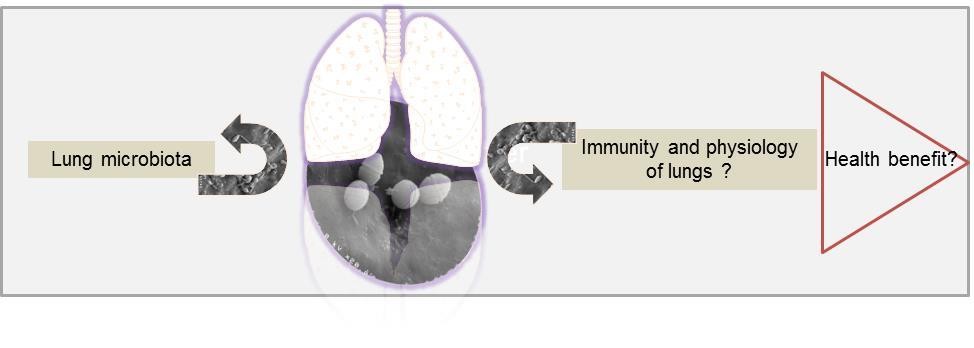
Daniyah Abdullah Alkhawtani
Prince Sultan Military Medical City, Saudi Arabia
Title: Effect of probiotics and prebiotics on gut integrity in critically ill patients
Biography:
Daniyah Abdullah Alkhawtani is a Clinical Dietitian at Prince Sultan Military Medical City, Riyadh, Saudi Arabia. She obtained her Bachelor of Clinical Nutrition from King Saud University, College of Applied Medical Sciences, Riyadh in 2011. She pursued her Master of Clinical Nutrition in 2013. Furthermore, she obtained Diploma in Sport and Exercise Nutrition.
Abstract:
Gut failure is common in ICU patients, characterized by lack of bowel sounds, regurgitation, vomiting, high gastric residual volumes (>500 mL/day), diarrhea, constipation, abdominal distension or GI bleeding. During critical illness, several factors might affect gut micro-flora that involve changes in stress hormones, gut ischemia, use of antibiotics and immunosuppression, gut microbiota, lack of nutrients and enteral feeding failure. Unfortunately, clinical evaluation of the gut function is difficult therefore gut dysfunction usually goes unrecognized related to poor clinical outcomes and high morbidity and mortality rate. Diet has the strongest effects on gut microbial colonization that could modify the profile of dominant species in human gut and offer different consequences of health. Recent data suggested preserving or re-establishing a healthy gut microbiota during and after critical diseases through targeted interventions such as probiotics, prebiotics, fecal microbial transplants (FMT), and synthetic stool pills. This review developed to evaluate the efficacy of probiotic/prebiotics in critical ill patients. Probiotics offers many benefits to the host including effective in the treatment or prevention of acute gastroenteritis, GI dysfunctions, antibiotic associated diarrhea (AAD), certain pediatric allergic disorders, necrotizing enterocolitis and inflammatory bowel disease (IBD). Based on the available studies, probiotics promise in reducing overall infections, sepsis, AAD and VAP in critical ill patients. Nonetheless, the role of probiotics on patients with CDAD and severe pancreatitis is still inconclusive. Unfortunately, limited studies are available on prebiotics and symbiotic. Briefly, probiotics use in the ICU remains widespread and no definitive recommendation for the routinely probiotics use in critically ill patients. Further studies are required to define the dose, types and safety of pro- and prebiotics in illness.
Norhafizah Abdullah
Universiti Putra Malaysia, Malaysia
Title: Survival performance of Enterococcus durans 39C using prebiotic- polymeric blend as an encapsulation matrix

Biography:
Norhafizah Abdullah is an Associate Professor in Department of Chemical and Environmental Engineering, University Putra Malaysia. She has more than 15 years of experience in academia and very active in teaching, research and technical consultation in the area of Biochemical Engineering.
Abstract:
The use of prebiotic material for probiotic microencapsulation is presented here. The objectives are to enhance its survival rate, colonic release, and stability of these probiotic cultures in digestive condition during storage time. Nine types of biopolymers (alginate-psyllium) blend with different concentration of prebiotic; (inulin or fenugreek) were used as candidate for microencapsulation matrix. One strain of probiotic candidate, Enterococcus durans 39C was used in this study. The microencapsulation of this strain with the respective polymer blend was performed by using a simple extrusion method. All blend of formulations have recorded high encapsulation efficiency at value >98%. The survival rate of viable probiotic cells under simulated digestive conditions was also high with value above 47% as compared to non-microencapsulated cells. These nine gel formulations also displayed the high survival rate of viable probiotic cells during storage time (28 d). Their release occurred after 2 h in colonic condition and sustained until 12th h of incubation period. An increase of prebiotic effect value added was observed in incorporated inulin and fenugreek formulations, hence, an indication for their suitability as matrix material for probiotic encapsulation.
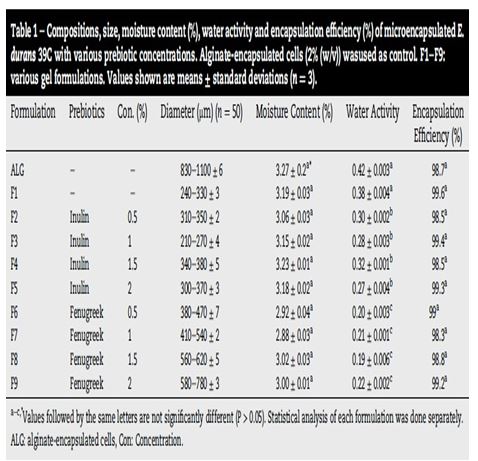
- Young Researchers Forum
Location: Bader
Session Introduction
Sarah Priour
Massey University, New Zealand
Title: Sugar Uptake by Lactobacillus rhamnosus and its impact on shelf life
Biography:
Sarah Priour graduated with an MSc equivalent Engineering degree from the University of Technology of Compiegne, France in 2014. She then began her career working as an Engineering Specialist within the Application Group division of Nescafe, Nestle S.A. (Switzerland) where she was In Charge of developing coffee roasting recipes and monitoring powder homogeneity. In 2015, she changed roles within Nestle becoming a Junior R&D specialist in PTC Orbe (Product Technology Centre). Within this position her focus was on understanding the properties of cocoa powder and the impact of processing parameters, more specifically studying the roasting and alkalization steps. In late 2015, she commenced a PhD in Food Technology, at Massey University, New-Zealand. Her research focuses on the microencapsulation of probiotics, and specifically on how to protect them from elevated temperatures in the dried state.
Abstract:
To increase the survival of probiotics in a dried state, it is advised to expose the bacteria to protectants for a time prior to processing, to allow equilibration of solutes. However, the ideal temperature and exposure times remain unclear. This study examined solute uptake by a Lactobacillus rhamnosus strain at 4°C and 20°C over 0 to 240 min. The cells were subjected to hyperosmotic solutions of glucose and sucrose, both selected as model sugars, as they are metabolized by the organism and differ in size. During the period of exposure, the metabolism was stopped, and cells were centrifuged to analyse the cell extracts and supernatants for lactic acid and sugar content. The impact of these parameters on the cell viability was followed at 40°C for 3 months after freeze-drying. Finally, the effect of these sugars on cell biomolecule denaturation was examined using Nano-differential scanning calorimetry (Nano-DSC). HPLC analysis showed that the sugars were rapidly taken up by the cells, independent of exposure temperature. At 20°C, glucose was readily metabolized. However, the production of lactic acid was significantly reduced when cells were exposed to sucrose, or to glucose at 4°C. The storage study showed that sucrose was a better protectant than glucose for this bacterial strain. The survival was slightly better when cells were exposed at 20°C rather than 4°C. There was a clear reduction in bacterial viability when they were exposed to glucose at 20°C: the longer the exposure, the greater the reduction. The Nano-DSC study revealed the appearance of a cold stress response when cells were exposed to sucrose or phosphate buffer. This response could be due to the formation of a DNA coil structure. In conclusion, sugar type and exposure temperature were shown to exert a significant effect on the viability of the particular Lactobacillus rhamnosus strain studied.
Pooja Goyal
Postgraduate Institute of Medical Education and Research, India
Title: Nutritional Assessment in Children with Chronic Liver Disease

Biography:
Pooja Goyal has her expertise in Nutrition in clinical researches and passion in improving the health of individuals with right diet. She has particularly dealt with malnutrition in children. She is Registered Dietician (RD) and working in Health Department Govt. of Punjab India. She is member of Indian Dietetic Association (IDA) and also Nutrition Society of India (NSI). She has presented her research papers in conferences and also given lectures. Recently, she has published her research article in Food Nutrition Bulletin (FNB). She is also pursuing her PhD on the topic “Effect of probiotics for the management of obese children with fatty liver”.
Abstract:
Statement of the Problem: Children with chronic liver disease (CLD) are at high risk for malnutrition and so nutritional deficiencies are common in them. Protein and energy intake is inadequate because of anorexia, early satiety and therefore nutritional assessment is important in detecting and monitoring treatment of malnutrition.
Objective: The purpose of this study was to determine dietary intake and nutritional status in children with CLD.
Methodology & Theoretical Orientation: We studied 49 children of age group 3-60 months suffering from CLD. Their intake by three day dietary recall method and anthropometric measurements including weight, height, triceps skin fold (TSF), mid arm circumference (MAC) was measured by standard scales. Wherein arm muscle area (AMA) and arm fat area (AFA) were calculated by measuring TSF and MAC.
Findings: Calorie deficiency was more pronounced in neonatal cholestasis (46%) and protein deficiency was pronounced in cirrhosis (74%) (p<0.001). The anthropometric analysis was done with mean Z score. Weight for age was more depressed in cirrhosis (-1.83±0.76) and least depressed in others (-0.20±0.44) (p value=0.19). Height for age was more depressed in biliary atresia (BA) (-2.20±1.30) and least depressed in autoimmune hepatitis (AIH) (0.00±2.12) (p value=0.58). Weight for height was more depressed in neonatal cholestasis (-1.17±1.32) and least depressed in others (-0.20±0.44)(p value=0.31). Z score for MAC and TSF were also analyzed. MAC was more depressed in BA (-1.80±1.78) (p value=0.53). TSF was significantly depressed in all of CLD patients (p value=0.04).
Conclusion: Nutritional intake in CLD was grossly inadequate in neonatal cholestasis (including BA) than other CLDs. Inadequate diet and poor nutritional status were the main cause of underweight and stunting in children with CLD. TSF thickness was significantly depressed in all of CLD patients. There is need of proper nutritional therapy, so individualized approach should be planned for nutrition support and management of specific liver disease patients.
Figure 1: Relationship of Z scores for MAC and TSF thickness between actual intakes of children with CLD. A significant relationship (p<0.05) was demonstrated (r=0.409 p=.003, r=0.431 p=.002).
Amru Houssien
Almaarefa Colleges for Science & Technology, Saudi Arabia
Title: How significant is the negative impact of pork and alcohol on microbiota?
Biography:
Amru Houssien is pursuing his degree in Medicine in Riyadh.
Abstract:
People who do not eat pork nor drink alcohol believe that there is wisdom behind any religious ruling whether known to mankind or not yet. Trusting that applied sciences are discovering or unveiling some previously unknown findings, this work attempts to find out if contemporary science found some of the tangible reasons for this prohibition in religion(s) and its counterpart in Judaism as stated in the Bible Leviticus 11:8 “not even to touch their carcass”. In the Holy Quraan "he has forbidden to you carrion, and blood, and the flesh of swine". Pork is the most widely eaten meat in the world, making up about 38% of meat production worldwide. So, its interaction with microbiota is inevitable. Regardless of one’s spiritual beliefs, the decision to include pork as a regular part of diet must be carefully considered. According to a surprising recent investigation of consumer reports that 69% of all raw pork 200 samples tested were contaminated with the dangerous bacteria Yersinia enterocolitica, which causes fever and gastrointestinal illness and stomach cramps. Pork meat is a major cause of foodborne salmonellosis in many countries and is the second most common cause of food poisoning in the UK after Campylobacter. Every year in the US, approximately 80,000 cases of salmonellosis are reported and 580 persons die. Studies on pork samples revealed that the presence of common causes of foodborne illness such as Salmonella, Staphylococcus aureus, or Listeria monocytogenes in 3-7% of samples while 11% of pork samples harbored Enterococcus, which indicates fecal contamination and can cause problems such as urinary-tract infections. A variety of parasites and worms could be carried by pork and can infect the intestinal tract by affecting the microbiota and causing leaky gut syndrome. Similarly, recent research reported that alcohol abuse can alter the delicate equilibrium and disrupt the intestinal environment and can cause gut permeability, also known as a leaky gut syndrome.
- Day 2 the sessions will be continued in the meeting room Wright with Agriculture & Horticulture and Organic Farming Conference

